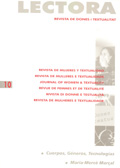Domesticacions, domesticitats i altres qüestions de gènere
Resum
This article uses Lyotard’s theory linking the origins of thinking with desire and with the existence of a sexually- differentiated body to examine Maria-Mercè Marçal’s poem, “El meu amor sense casa,” as a “lyrical practice of feminism and difference, a writing of the body.” From this perspective, it pays attention to Marçal’s poetry as an inscription of sexual difference in language and literary practices, transforming them, destabilizing them and turning them into thinking tools for all. The central figure of the home or domus in the poem embodies the binary ambiguities that are largely undone by the appropriation of a hegemonic discourse by a body that is generically and sexually “different.” Marçal’s poem thus provides an architectural genealogy of a poetic subject that thinks in a body that is both female and lesbian.Descàrregues
Publicades
Com citar
Número
Secció
Llicència
Els autors i les autores conserven els drets d’autoria i atorguen a Lectora: revista de dones i textualitat el dret de difusió. L'’obra serà disponible simultàniament sota una Llicència de Reconeixement-NoComercial- SenseObraDerivada de Creative Commons que, si no si indica el contari, permet compartir l’obra amb tercers, sempre que aquests en reconeguin l’autoria i la publicació inicial en aquesta revista.
Els autors i autores són lliures de fer acords contractuals addicionals independents per a la distribució no exclusiva de la versió de l’obra publicada a la revista (com ara la publicació en un repositori institucional o en un llibre), sempre que se’n reconegui la publicació inicial en aquesta revista.
S’encoratja els autors i autores a reproduir la seva obra en línia (en repositoris institucionals, temàtics o a la seva pàgina web, per exemple), amb l’objectiu d’aconseguir intercanvis productius i fer que l’obra obtingui més citacions (vegeu The Effect of Open Access, en anglès).




